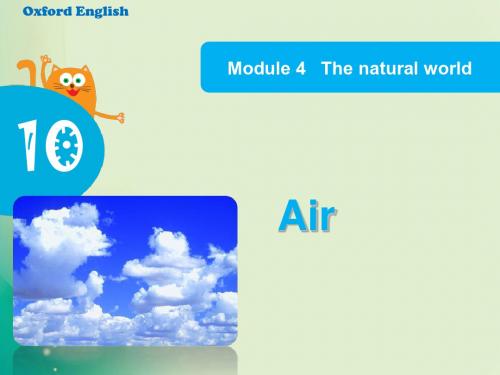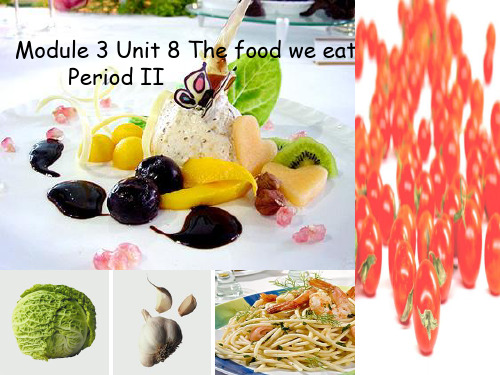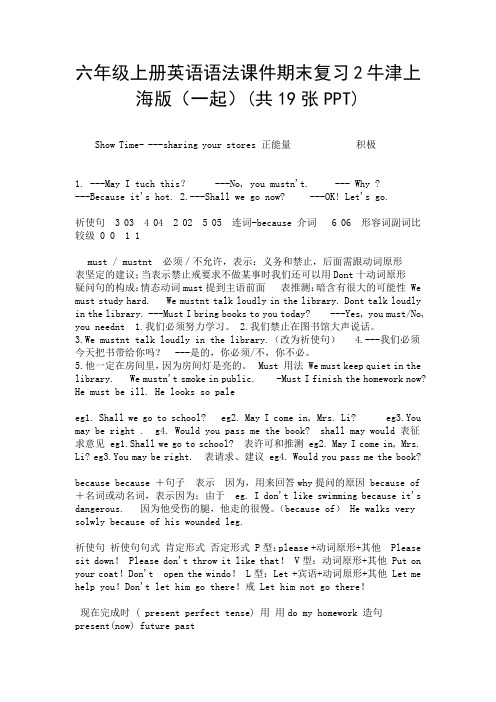六年级上册英语课件现在完成时1牛津上海版(一起)(共17张PPT).doc
上海沪教牛津版英语六年级上册Unit 12 The Earth 课件

and
land [læ nd]
陆地(名词)
land (陆地)
stand (站立)
hand (手)
例:We live on land. 我们生活在陆地上。
……………………………………………………………………………………………………………………………………………………………………
13
……………………………………………………………………………………… ………………………………………………………………………………………
cart (马车)
smart (聪明的)
例:The part is very beautiful. 这个地区很漂亮。
……………………………………………………………………………………………………………………………………………………………………
5
……………………………………………………………………………………… ………………………………………………………………………………………
beautiful in the past, but now some parts
are dirty. Can we do anything to help the
Earth?
Alice: Yes. We should stop throwing rubbish into rivers.
Peter: We should stop cutting down so many trees. Kitty: We should stop using plastic bags.
Amy helps her mother make lunch.艾米帮助她的妈妈做午餐。
……………………………………………………………………………………………………………………………………………………………………
初中英语六种时态复习课件(35张PPT)

②while 引导的从句表示“在……期间”,主从句谓语动词所表示的动 作同时ቤተ መጻሕፍቲ ባይዱ生。这时,主从句都用过去进行时。
e.g.:My father was reading the newspaper while my mother was watching TV.当我的妈妈看电视的时候,我的爸爸正在看报纸。
(2)表示普遍真理或客观事实。 e.g.:The sun rises in the east.太阳从东方升起。 (3)在条件状语从句和时间状语从句中,用一般现在时表示将来。 e.g.:If it doesn't rain tomorrow,we will go for a picnic.如果明天不下 雨,我们将去野餐。 (4)在某些以 here,there 开头的句子中用一般现在时表示正在发生的动作。 e.g.:There goes the bell.铃响了。
(3)现在进行时表示将来 表示位置移动的动词 go,come,leave,fly,start,meet,move 等, 可以用现在进行时表示将要发生的事。 e.g.:We are leaving for London.我们就要动身去伦敦了。
(4)一般现在时表示将来 ①表示按规定或时间表预计要发生的动作。 e.g.:Our plane takes off at 8:10.我们的飞机 8:10 起飞。 ②当主句为一般将来时,或含有情态动词,或是祈使句时,在 if,as soon as,until,when 等引导的状语从句中用一般现在时表示将来。 e.g.:I will give him the book as soon as he comes here.他一来这儿, 我就把这本书给他。
(2)表示当前一段时间内的活动或现阶段正在进行的动作。 e.g.:They are picking apples on a farm all the time.他们一直在农场 摘苹果。 (3)与 always,usually 等词连用,表达说话人强烈的感情,如赞扬、不 满、讨厌等。 e.g.:Mary is always thinking of others instead of herself.玛丽总是为 别人着想,而不为自己着想。
六年级上册英语课件-Unit 10《Air》(Period 1)_牛津上海版 (共38张PPT)

Think and complete
It has no _c_o_l_o_u_r or __s_h_a_p_e_. It has no __sm__e_ll__ or __ta_s_t_e__. We cannot _s_e_e_ it, but we can _f_e_e_l it.
2. Recite the riddle in “Listen and say” on Student’s Book page 68.
3. Make a toy parachute. 4. Finish Workbook pages
56 and 58.
It keeps them high in the sky.
Read and recite
It is air.
It has no colour or shape. It has no smell or taste. We cannot see it, but we can feel it.
It is everywhere. It is important to all people. It is also important to animals and plants. We all need it to keep us alive.
They ride on air.
What is it? Does it have any colour or taste? Can you see or feel it?
What is it? It is air.
Does it have any colour or taste?
No, it doesn’t. Can you see or feel it?
沪教牛津版小学六年级上册英语Module 1 Revision 1课件

I visited my grandparents
We went to Beijing
.
I visited my grandparents.
We went to Beijing.
am, is→was are→were do→did go→went eat→ate
Think and write
You were young.
How was your summer holiday ? was fun
It was not bad .
How was your summer holiday?
It was fun.
It was not bad.
How was your summer holiday?
I had some noodles.
Think and say
I had some noodles for breakfast this morning. What did you have for breakfast?
I had…
What did you have for dinner yesterday?
was were went ate did visited played Jane: Hello, Kate. This is Jane. How _w_a_s_ your holiday? Kate: Hi, Jane. It was fun. I _v_is_i_te_d_ my aunt and uncle in
Jane: I _d_i_d_ my homework and cleaned my room.
Let’s revise(Ⅱ)
breakfast this morning
六年级上册英语课件-Unit 6《Going to school》|牛津上海版(一起) (共13张PPT)

bus.
C: I see trees, shops and gardens when I’m
on the bus.
D:… E:… F:… G:…
• In pairs, talk about what you see on your way to school.
Welcome to Hannah’s class!ferry lig来自t railtemple
kindergarten
an advertisement board
housing estate
department store
a few
a lot of
Listen and match
Things trees
I see a few parents, some teachers and a lot of students when I’m walking to school.
I see a lot of some a few
____ when I am _________.
in the department store
flowers
grass
supermarkets housing estates shops
schools
advertisement boardstemples
department storesgardens
offices
restaurants
factories
banks
kindergartens police stations
some
walking to school.
精品最新 六年级上册英语课件-Unit 8《The food we eat》|牛津上海版(一起) (共15张PPT)

fruit
lemon strawberry … the food we eat
prawn …
seafood
drinks
cola tea …
noodle …
snacks
meat
bacon chicken …
There are many different kinds of food around us.
Vegetable salad
Fried cabbage
A: Would you like vegetables?
B: Yes, please.
A: What kind of vegetables would you like?
B: I’d like…..
Fried chicken wings
Steamed fish
fried chickenw_i_n_g_s__
salad
steamed fish
Eggs
steamed
________prawns with
garlic
steamed eggs (with meat) Soup
fried eggs w__it_h__bacon chicken_s_o_up____
Would you like … or …?
Pretend that you have a restaurant. Make a menu for your restaurant.
MENU
Vegetables
Meat
Seafood
Eggs
Soup
Staple diet主食
Introduce your menu
Make up a dialogue between a customer and a waiter
六年级上册英语语法课件期末复习2牛津上海版(一起)(共19张PPT).doc

六年级上册英语语法课件期末复习2牛津上海版(一起)(共19张PPT)Show Time- ---sharing your stores 正能量积极1. ---May I tuch this? ---No, you mustn't. --- Why ?---Because it's hot. 2.---Shall we go now? ---OK! Let's go.祈使句 3 03 4 04 2 02 5 05 连词-because 介词 6 06 形容词副词比较级 0 0 1 1must / mustnt 必须/不允许,表示:义务和禁止,后面需跟动词原形表坚定的建议;当表示禁止戒要求不做某事时我们还可以用Dont十动词原形疑问句的构成:情态动词must提到主语前面 We must study hard. We mustnt talk loudly in the library. Dont talk loudlyin the library. ---Must I bring books to you today? ---Yes, you must/No, you neednt 1.我们必须努力学习。
2.我们禁止在图书馆大声说话。
3.We mustnt talk loudly in the library.(改为祈使句)4.---我们必须今天把书带给你吗? ---是的,你必须/不,你不必。
5.他一定在房间里,因为房间灯是亮的。
Must 用法 We must keep quiet in the library. We mustn't smoke in public. -Must I finish the homework now? He must be ill. He looks so paleeg1. Shall we go to school? eg2. May I come in, Mrs. Li? eg3.You may be right . g4. Would you pass me the book? shall may would 表征求意见 eg1.Shall we go to school? 表许可和推测 eg2. May I come in, Mrs.Li? eg3.You may be right. 表请求、建议 eg4. Would you pass me the book?because because +句子表示因为,用来回答why提问的原因 because of+名词或动名词,表示因为;由于 eg. I don't like swimming because it's dangerous. 因为他受伤的腿,他走的很慢。
六年级上册英语课件-Module 1 Revision 1|沪教牛津版

Let’s revise(Ⅱ)
breakfast this morning
What did you have for lunch
yesterday
?
dinner
some bread and milk I had a lot of rice and vegetables .
I had…
What did you have for breakfast?
I had an egg, an orange and some milk.
What did you have for lunch?
I had beef, vegetables and rice.
What did you have for dinner?
Beijing. We w__e_n_t to the Great Wall and a_t_e_ Beijing Roast Duck. We had a great time.
was were went ate did visited played I also _p_l_a_y_e_d_ with my cousins. They _w__e_r_e_ short last year, but now they’re tall and strong. How about you? What did you do during the holiday?
You were young.
How was your summer holiday ? was fun
It was not bad .
How was your summer holiday?
- 1、下载文档前请自行甄别文档内容的完整性,平台不提供额外的编辑、内容补充、找答案等附加服务。
- 2、"仅部分预览"的文档,不可在线预览部分如存在完整性等问题,可反馈申请退款(可完整预览的文档不适用该条件!)。
- 3、如文档侵犯您的权益,请联系客服反馈,我们会尽快为您处理(人工客服工作时间:9:00-18:30)。
六年级上册英语课件现在完成时1牛津上海
版(一起)(共17张PPT)
现在完成时概念用法构成 1. 表影响 2. 表继续 3. 表经验现在完成
时态表示过去发生的动作对现在的影响戒有无某方面的经历 have/has + 动词
过去分词
过去分词的构成 1 2 3 4 ①一般情况词尾+ed walkwalked ②以不发
音字母e结尾词尾+d hopehoped ③以辅音字母+y结尾变y为i,再加-ed
carrycarried ④以重读闭音节结尾,且末尾只有一个辅音字母双写词尾+ed planplanned
现在完成时的用法表影响和already, yet, just等连用表继续与in the
last (past), since, for a long time 等连用表经验常和never, ever, once,
three times, before, ever since, recently等连用 1) I have already posted
the photos. 我已经把照片寄了。
(照片不在我这里了) 2) ---have you had
your lunch yet? 你吃午饭了吗? ---Yes, I have just had it. 是的,
我吃了,我刚刚吃过。
(现在不饿了). 1)They have lived here since 1989. 自
从1989年以来,他们就住在这里。
2) She has been there for over two years.
她在那里两年多了。
. 1) I have never been to Egypt before. 我以前从没
去过埃及。
2) He has been to Egypt three times. 他去过埃及3次了。
1. We ___ a new school in my hometown recently (最近). A. build
B. have built
C. built
D. will build 2.----Did
your brother go to America last year? ---- ________. A.No, he did never
go there B. No, he has never gone there C. No, he
never was there D. No, he's never been there 3
_____ the Great Wall? A. Have you ever gone to B.
Are you ever going to C. Do you ever go to D.
Have you ever been to 4.I___ the book yet. A. haven't read B.
hadn't read C. don't read D. am not reading 5 They
left for Beijing last month and we ___ them ever since. A. don't hear
from B. haven't heard from C. won't hear from D. didn't
hear from
A B 现在完成时和一般过去时的区别强调点不同 A 时间状语不同 B 1) A: Have
you seen the film? B: Did you see the film? A句强调的是被问者对剧
情是否了解;B句强调的是这部电影的动作是否发生过,并不强调是否知道其内
容。
2)A: She has watered the flowers. 她已经浇了花。
(不需要再浇了)
B:She watered the flowers yesterday. 她昨天浇的花。
表示过去的时间状
语如: yesterday, last week , two years ago ,just now ,in 2002 等,以
及when为首的疑问句与一般过去时连用,而不与现在完成时连用。
Tom has
written a letter to his parents last night. (错)
have been to, have gone to have been in 1 2 3 4 Fast and effective creation
of your presentation have been to 表示去了已回 have gone to 表示去了未
回 have been in 表示已在该地(待了多久)
1 My father isn't here now. He ___Shanghai. He ___ there twice. A. has
gone; has been B. has gone to; has been to C. has been to;
has gone D. has gone to; has been 2 -Hi! Bruce. I havent seen you
for three weeks. -Hi! George. I___ America. A. have gone to B.
went to C. have been to D. have been in 3 My
uncle___ London for five years. But he will be back next year. A. went B. has been in C. has gone D. has gone to 4 -Could
I speak to Mrs. Black, please? -Sorry, she ___ to the library. A. is
going B. has gone C. has been D.
will to 5 Peter is young, but he___ many foreign countries. A. has been
in B. has gone to C went to D. has been
to
瞬间动词VS 延续性动词瞬间动词 come, go, leave, start, die, finish,
become, die等(占动词的大部分)延续性动词 live, teach, learn, work,
study, know.(相对较少)
begin/start --- be on 现在完成时态中,当句中含有一段时间状语时((for+
时间段或者since+ 时间点/ 句子)谓语动词短暂变延续!
1)现在完成时的构成和用法 2)现在完成时和一般过去式的区别 3)have been
to, have gone to和have been in 的区别 4)现在完成时态中,当句中含有一
段时间状语时,谓语动词短暂变延续!
1. 复习精讲提升部分的内容;
2. 请在规定时间内完成讲义中的课后巩固部分。
